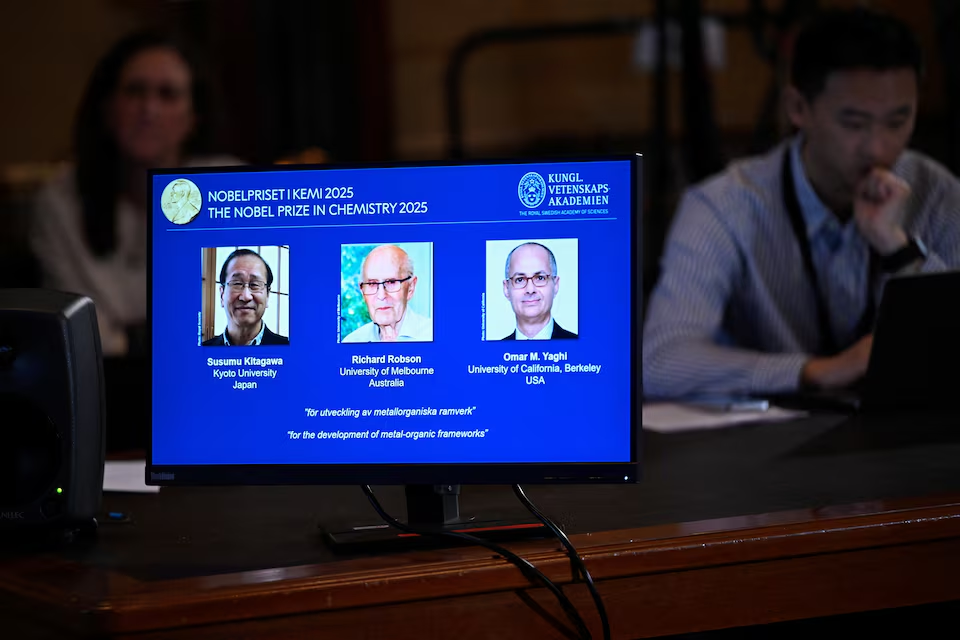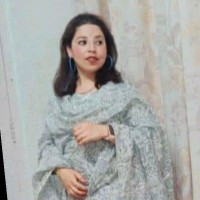Three Scientists Win Nobel Prize in Chemistry for Work on ‘Hermione’s Handbag’-Like Materials

Scientists Susumu Kitagawa, Richard Robson, and Omar Yaghi have been awarded the 2025 Nobel Prize in Chemistry for developing a new class of molecular structures that could help tackle challenges such as climate change and freshwater scarcity.
The three laureates pioneered the creation of metal-organic frameworks (MOFs) — crystalline materials with vast internal spaces through which gases and other chemicals can flow. These porous compounds can be used to harvest water from desert air, absorb carbon dioxide, and store toxic gases, among other applications.
Describing the “remarkable properties” of these materials, the Nobel Committee said that some possess extraordinarily large surface areas — “a porous substance the size of a sugar cube can contain as much internal surface as a football field.”
Olof Ramström, a member of the Nobel Committee for Chemistry, compared their capacity to Hermione’s handbag from Harry Potter, saying, “A small amount of this material can hold an enormous volume of gas.”
Beyond climate solutions, MOFs may also help combat ‘forever chemicals’ (PFAS) and break down pharmaceutical residues in the environment.
The century-old Nobel Prize in Chemistry is awarded by the Royal Swedish Academy of Sciences, and this year’s winners will share 11 million Swedish kronor (about $1.2 million) along with the prestige of one of the world’s most coveted scientific honors.
At the Nobel press conference, Kitagawa expressed deep gratitude for the recognition.
“My dream,” he said, “is to capture air and separate it — for example into CO₂, oxygen, or water — and convert it into useful materials using renewable energy.”
Following their discovery, chemists around the world have synthesized thousands of different MOFs, some of which, according to the Academy, could help “solve some of humanity’s greatest challenges.”
Kitagawa is a professor at Kyoto University in Japan, Robson teaches at the University of Melbourne in Australia, and Yaghi is a professor at the University of California, Berkeley. Kitagawa is Japanese; Robson, originally from Britain, moved to Australia in his late twenties; and Yaghi is a Jordanian-American scientist.
“Science Is the Greatest Equalizing Force”
Born in Jordan to Palestinian refugee parents, Yaghi grew up in a one-room home shared with livestock. In an interview on the Nobel website, he said, “It’s been a long journey, and science allows you to make that journey.” He added that his parents were barely literate, yet “science is the greatest equalizing force in the world.”
Yaghi recalled that his lifelong fascination with chemistry began at age ten, when he found a book about molecules in a library. “The deeper you explore,” he said, “the more beauty you find in how things are constructed.”
Robson told Reuters he received a call from Stockholm about half an hour before the official announcement and celebrated quietly at home near Melbourne.
“I cooked fish for dinner with my wife and then did the dishes,” he said, adding with a laugh, “I’d recently sworn off alcohol for health reasons, but I broke that rule with a glass of very cheap wine.”
Next Up: The Nobel Prize in Literature
The Chemistry Prize is the third Nobel announced this year, following awards in Medicine and Physics earlier in the week.
Established in the will of Alfred Nobel, the Swedish inventor and industrialist, the Nobel Prizes have been awarded since 1901 in recognition of major contributions in science, literature, and peace, with brief interruptions during the world wars.
Nobel himself was a chemist whose innovations — notably the invention of dynamite — helped generate the fortune that funds the prizes. The Economics Prize, often associated with the Nobels, was introduced later and is funded by Sweden’s central bank.
Although sometimes overshadowed by the more widely known Nobel Prizes in Peace, Literature, or Physics, the Chemistry Prize has honored some of science’s most influential breakthroughs, including nuclear fission, DNA sequencing, and yeast genetics.
Last year’s Chemistry Prize went to David Baker, John Jumper, and Demis Hassabis for their groundbreaking work on predicting and designing protein structures — research that has transformed drug development and biotechnology.
(Exchange rate: $1 = 9.3436 Swedish kronor)

Continuing the achievement of the journey of effectiveness and credibility of more than 10 years in the career of journalism, as a woman journalist, I am Serving as the founder, promoter and editor of DiaryTimes with the trust and support of all. My credible coverage may not have given a big shape to the numbers, but my journey presents articles that make you aware of the exact and meaningful situations of Himachal’s politics, ground issues related to the public, business, tourism and the difficult geographical conditions of the state and financial awareness. DiaryTimes, full of the experience of my precise editorial expertise, is awakening the flame of credible journalism among all of you, so that the eternal flame of meaningful change can be lit in the life of the people of the state and the atrocities being committed against the people can be brought to the fore, I am motivated for that. If even a small change comes with the power of my journalism and the whole world becomes a witness to that issues, then I will consider myself fortunate.





